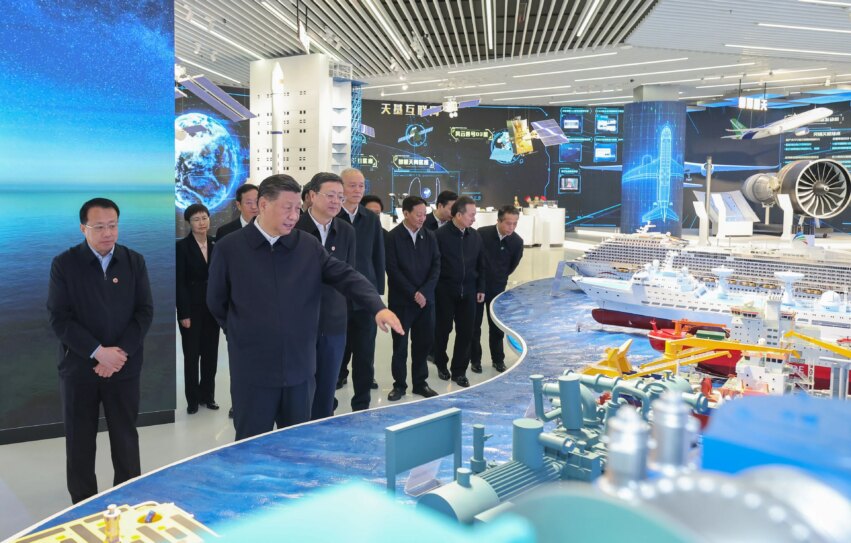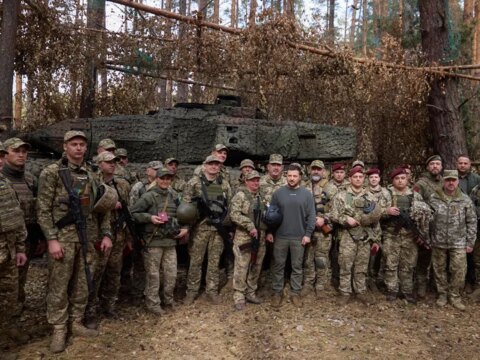The U.S. Department of Defense has warned that China’s artificial intelligence (AI) initiatives have seen heavy integration with the People’s Liberation Army (PLA), raising concerns of a possible AI arms race. “The size, scope and sophistication of Chinese military modernization programs is breathtaking,” James Anderson, who served as the deputy undersecretary of defense during the Trump administration, told Fox News Digital. “The report makes clear that Beijing remains hellbent on developing a world-class military force, despite its recent economic slowdown.”The annual Pentagon report on the Military and Security Developments involving the People’s Republic of China argues in the preface that China remains “the” pacing challenge for the Department of Defense as Beijing seeks “national rejuvenation” by 2049 – the centenary anniversary for the Chinese Communist Party (CCP). Chief among the various avenues the party has pursued to achieve this goal stands the “multi-domain precision warfare” concept, which seeks to incorporate advances in big data and AI to “rapidly identify key vulnerabilities in the U.S. operational system and then combine joint forces across domains to launch precision strikes,” according to the report. EUROPE SEALS WORLD’S FIRST SET OF RULES REGULATING ARTIFICIAL INTELLIGENCEThe concept would help China develop “additional subordinate operational concepts” with an eye toward refining China’s capabilities to fight and win “future wars.” The country’s latest Five-Year Plan prioritizes these developments, which the Pentagon claimed would include advances in “brain science” and biotechnology, semiconductors and deep space, deep sea and polar-related tech. Chinese President Xi Jinping inspects an exhibition on Shanghai’s sci-tech innovations in Shanghai on Nov. 28, 2023. (Wang Ye/Xinhua via Getty Images)Brain science looks to integrate new biotech and AI applications, including a quantum computer capable of “outperforming a classical high-performance computer for a specific problem,” spending over a billion dollars on a national quantum facility that will be the world’s largest such facility when completed. “Beijing has a clear understanding of its remaining S&T deficiencies and wields industrial policies and the country’s massive tech transfer apparatus in an effort to close these gaps,” the report stated. “China also sustains high levels of R&D funding and offers significant subsidies to domestic companies working on frontier technologies.” Soldiers quickly get out of their cars to take up positions during military drills in Jiangxi, China, on Jan. 29, 2023. (CFOTO/Future Publishing via Getty Images)China seeks to lead the world in AI development by 2030, according to the report, having designated the technology as key to “intelligentized warfare,” which is how the CCP views the future of combat. The Pentagon admits China already is the world leader in facial recognition and natural language processing technology, but it remains “silent” on “certain foreign capabilities” to produce hardware, including the most advanced semiconductor chip factories and electronic design automation software. WHAT IS ARTIFICIAL INTELLIGENCE (AI)?”China wants to match and surpass the United States in AI by 2025,” Matt McInnis, senior fellow for the Institute for the Study of War’s China program, told Fox News Digital. “The United States is at risk of falling behind China in this area, including the integration of AI into warfighting systems.” Chinese President Xi Jinping inspects the Shanghai Futures Exchange, an exhibition on Shanghai’s sci-tech innovations, and a government-subsidized rental housing community, learning about the city’s efforts in strengthening its competitiveness as an international financial center, building the city into an international sci-tech innovation center, and constructing government-subsidized rental housing projects. (Xie Huanchi/Xinhua via Getty Images)”America still has enormous resources and potential to stay at the top of the AI game, though,” he argued. “In addition to our more open and competitive environment for AI development … we may have an advantage in taking a slower, more deliberative approach to deploying AI in warfare.””China places enormous importance on AI and other advanced technologies to overtake the U.S. military, often to the detriment of the training, doctrine, and personnel development that the PLA also needs. AI is not the panacea for the PLA’s weaknesses,” he stressed, adding that success for the U.S. will require “finding the vulnerabilities China creates by being over-dependent on AI.” Employees work at an intelligent furniture factory using 5G and artificial intelligence technologies on Oct. 21, 2020 in Ganzhou, Jiangxi Province of China. (Liu Zhankun/China News Service via Getty Images)The Pentagon’s report included a wide range of assessments of China’s current capabilities, but Anderson warned that the broadly “opaque nature” of China’s systems makes it difficult to ascertain the full extent of the country’s development of AI technology. AI DEVELOPMENT BOOM COULD PIT US VS CHINA WITH ANOTHER CHIP SHORTAGE: EXPERTS”The U.S.’s advantages in AI-related technologies is no cause for comfort since they appear to be shrinking relative to Chinese advances,” Anderson warned. “There is no question that China aims to be the world leader in AI by the end of the decade, and it is sparing no expense to achieve this goal.””AI technologies will increase the speed and lethality of new military platforms, while breathing some new life into old ones,” he noted. “Air, sea, land, and spaced-based unmanned platforms driven by AI will proliferate in the coming years and play a key role in any major U.S.-China military confrontation.” A Chinese soldier salutes in front of a drone during a parade to celebrate the 70th Anniversary of the founding of the People’s Republic of China at Tiananmen Square in 1949, on Oct. 1, 2019 in Beijing. (Kevin Frayer/Getty Images)”The ability to employ AI-related technologies at scale is critical,” Anderson explained. “Last summer, the Pentagon announced its Replicator Initiative to produce and deploy thousands of AI-guided drones in the Indo-Pacific. It is an open question whether the Pentagon can follow through given the shrunken and dilapidated state of America’s Defense Industrial Base.”In addition to the AI capabilities, the report highlighted the frightening pace at which China has developed its nuclear arsenal, with the intention to match up against U.S. and Russian capabilities, which in turn would create a tripolar global dynamic. CLICK HERE TO GET THE FOX NEWS APPMcInnis and Anderson both highlighted the nuclear development as a significant concern in the report: McInnis called China’s advancements “concerning,” while Anderson called the trajectory “alarming.” “The strategic significance of this development is hard to overstate,” Anderson said. “In just a few years, the United States will, for the first time in its history, have to deter two nuclear peers in Russia and China simultaneously.” Peter Aitken is a Fox News Digital reporter with a focus on national and global news.
















![Wanted: Suspect for Assault in the 17th District [VIDEO]](https://www.phillynewsnow.com/wp-content/uploads/2021/07/Assault-3021-Grays-Ferry-Ave-DC-21-17-018111-600x400-100x100.jpg)



